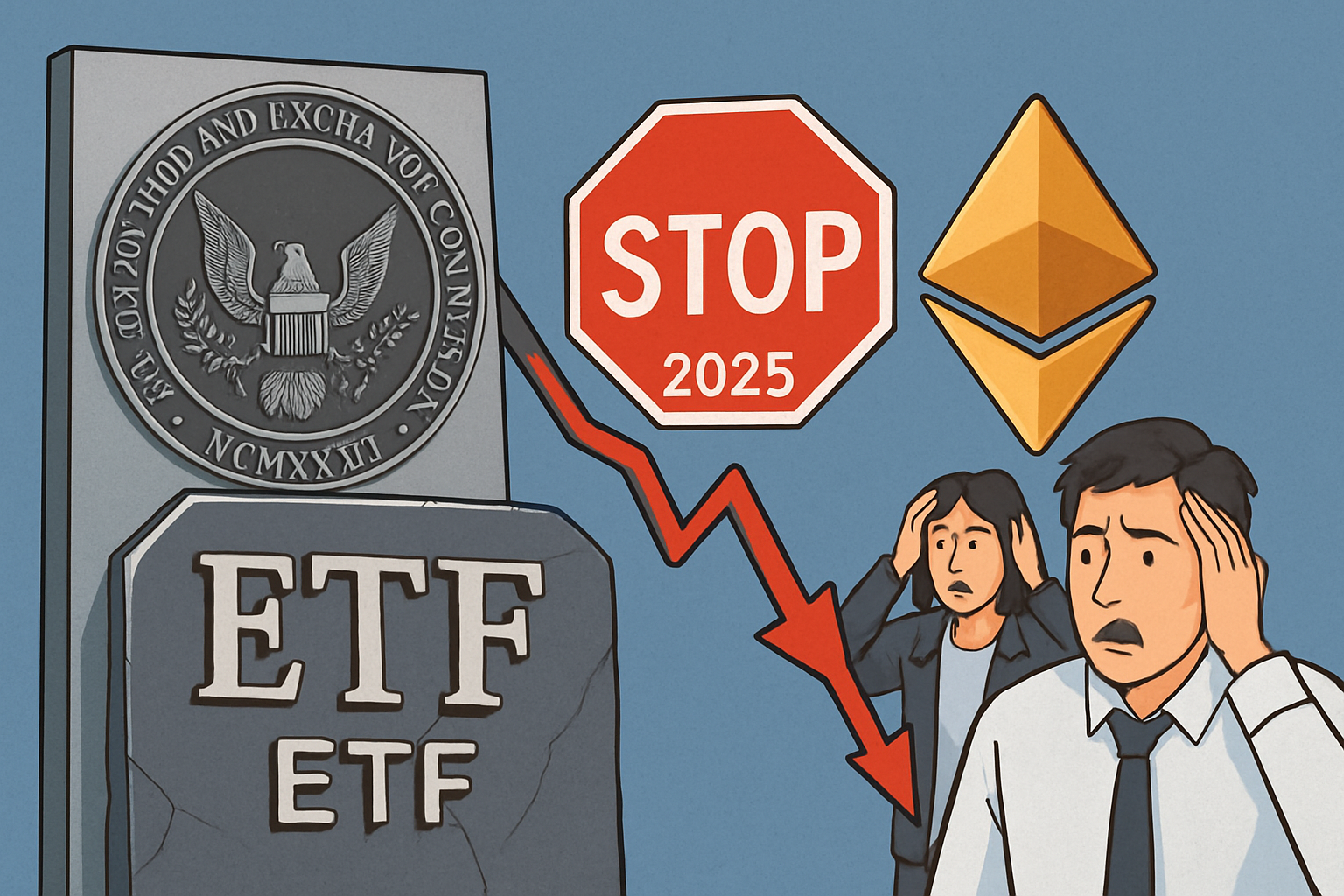Cryptocurrency
SEC’s Bizarre ETF Reversal: Ethereum, Bitcoin, And XRP Left In Limbo

Introduction
In a move that has rattled investors and deepened uncertainty within the digital asset sector, the U.S. Securities and Exchange Commission (SEC) has unexpectedly halted the approval of a highly anticipated crypto ETF proposed by Bitwise, which included Ethereum, Bitcoin, and XRP. The initial green light, granted just hours earlier, marked a seemingly pivotal moment for institutional crypto access in the United States. But in a baffling twist, the regulator pulled back the decision citing procedural irregularities and the need for further review.
The crypto ETF market, already buoyed by inflows from recent spot Bitcoin and Ethereum funds, was caught off guard by the SEC’s reversal. Analysts and industry observers are now left questioning the motives behind the delay and what this means for the future of multi-asset crypto ETFs. More importantly, it raises renewed questions about the consistency and transparency of the SEC’s regulatory process, particularly in the evolving crypto landscape of 2025.
Background: What Was The Bitwise Crypto ETF?
Bitwise Asset Management, a well-known player in the digital investment space, had proposed a new exchange-traded fund offering diversified exposure to multiple digital assets. This ETF was designed to include Ethereum (ETH), Bitcoin (BTC), and XRP among other large-cap cryptocurrencies. Investors viewed the ETF as a crucial step toward legitimizing multi-token investment strategies within traditional financial systems.
Approval from the SEC came on July 22, 2025, marking a breakthrough moment after years of regulatory roadblocks. Bitwise’s ETF, if fully operational, would have allowed traditional investors to gain exposure to a diversified crypto basket without directly managing wallets or dealing with exchanges. For the broader market, this was seen as a milestone for crypto mainstream adoption.
Yet, within 24 hours, the SEC issued a formal stay on the ETF’s conversion. The abrupt change left Bitwise, investors, and analysts scrambling for answers.
The Bizarre Reversal: SEC’s Official Explanation
According to official statements and reports from Bloomberg, Cointelegraph, and Decrypt, the SEC justified its reversal under Rule 431(e) — a procedural clause that allows the agency to suspend or rescind approvals pending a deeper internal review.
The decision was described by one anonymous SEC official as precautionary and driven by concerns over “market manipulation risks” and “incomplete disclosure of underlying asset exposure models.” However, the timing of the action — so soon after initial approval — raised alarms.
The most surprising element? This was not the first time the SEC reversed course on a crypto product. In early July, a similar stay was imposed on Grayscale’s attempt to convert their Digital Large Cap Fund into a multi-asset ETF. Industry watchers are beginning to view these sudden halts not as technical processes, but as signs of deeper regulatory indecision.
Market Reaction: Ethereum And XRP Feel The Shock
Following the SEC’s move, Ethereum saw immediate price volatility, although it held support above $3,600. XRP, on the other hand, dropped nearly 9% in less than 24 hours. Trading volumes surged on both tokens as investors rebalanced portfolios based on what many viewed as a destabilizing regulatory signal.
Bitcoin, while included in the proposed ETF, was less affected. Analysts suggest this is due to the already established presence of spot Bitcoin ETFs in the market, which have seen net inflows despite the SEC’s cautious stance on more complex funds.
Nevertheless, Ethereum’s status as the centerpiece of DeFi and Web3 development means that the pause in ETF approval could delay broader institutional adoption, especially among risk-averse entities such as pension funds and insurance companies.
Institutional Confusion: Confidence Undermined
Perhaps the most damaging outcome of the SEC’s decision was the erosion of institutional confidence. In recent months, major players including BlackRock and Fidelity had expressed growing interest in Ethereum and Ethereum-linked products. Several of these firms had even filed for Ethereum staking ETFs, believing that the regulatory tide had finally turned.
Now, those same institutions are left questioning whether the regulatory environment is mature enough to support long-term strategies involving digital assets. In a recent interview with Yahoo Finance, a fund manager from one top-tier asset firm called the SEC’s behavior “irrational and counterproductive to U.S. market leadership.”
SEC Vs. Crypto: A Pattern Of Mixed Signals
This latest reversal is not an isolated event. Over the past two years, the SEC’s stance on cryptocurrency has shifted unpredictably. While the agency has allowed spot Bitcoin ETFs to flourish, it has simultaneously pursued litigation against crypto exchanges and refused to clarify its position on Ethereum’s legal classification.
The inclusion of XRP in the Bitwise ETF may have also played a role. XRP has long been embroiled in legal controversy involving the SEC’s classification of it as a security. Despite a partial legal win for Ripple in 2023, uncertainty persists over XRP’s status, and that may have made regulators wary of approving any fund holding it alongside Bitcoin and Ethereum.
For many observers, the lack of a unified policy toward digital assets is becoming a systemic risk.
Industry Reactions: Frustration And Legal Challenges Loom
The crypto industry has not taken this development lightly. Bitwise has issued a public statement expressing disappointment and requesting urgent dialogue with the SEC. The company has not ruled out pursuing legal remedies if the reversal is not quickly resolved.
Meanwhile, advocacy groups such as the Blockchain Association and Coin Center have accused the SEC of regulatory overreach and inconsistency. They argue that sudden reversals like this create a chilling effect on innovation, especially for U.S.-based startups looking to expand token utility into financial products.
Legal scholars have noted that if Bitwise does file a lawsuit, the case could echo the 2023 Grayscale vs. SEC verdict, where a U.S. court sided with the crypto firm and compelled the SEC to re-review its denial of a Bitcoin ETF application. A similar precedent could be forming now.
The Global Context: US Falling Behind?
The regulatory indecision in the U.S. comes at a time when other major economies are accelerating their crypto ETF frameworks. In Europe, Ethereum and Bitcoin ETFs have already gained regulatory clarity in markets such as Germany and Switzerland. In Asia, countries like Hong Kong and Singapore are piloting multi-asset digital fund models with active government support.
This global contrast raises strategic concerns. If the SEC continues to waver, the U.S. may lose its edge in becoming a hub for compliant, institutional-grade crypto finance. Already, several American crypto startups have relocated operations overseas, citing more predictable regulation as a driving factor.
Conclusion
The SEC’s sudden reversal of the Bitwise ETF approval has sent a ripple through both the crypto markets and the financial institutions eager to expand their exposure to digital assets. What was meant to be a landmark moment for Ethereum, Bitcoin, and XRP has instead become a case study in regulatory unpredictability.
For Ethereum, the implications are especially significant. As the leading platform for decentralized applications, smart contracts, and staking infrastructure, Ethereum’s long-term integration into traditional financial products like ETFs is considered essential for mainstream adoption. This abrupt pause in regulatory momentum has not only hindered short-term institutional access but has also reignited deeper questions about Ethereum’s regulatory identity in the U.S. market.











